Guide for using the Issues Dashboard.
This Overview Dashboard provides a detailed view of various issues tracked within an organization, categorized by their priority, status, category and other attributes.
The dashboard is divided into three main areas:
- Summary KPIs (highlighted by the red outline below)
- Filters (highlighted by the green outline below)
- Charts & Tables (highlighted by the blue outline below)
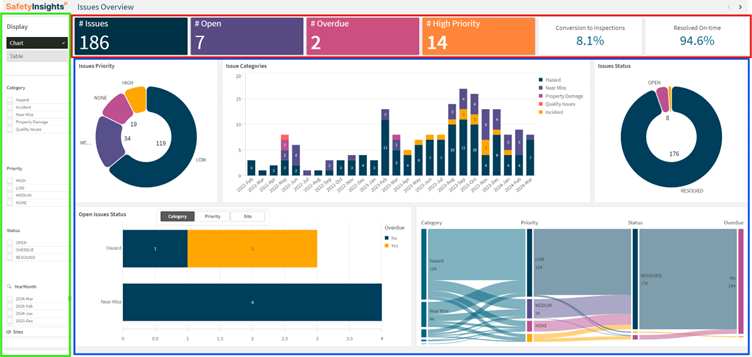
The top of the dashboard displays summary metrics, providing a quick snapshot of the current status of various issues. This allows you to monitor the status of your issues to understand the workload and progress and to identify priorities to recognise areas that need immediate attention, such as high numbers of overdue issues or open issues.
These KPIs are:
- # Issues
Total number of issues. - # Open
Total number of open issues. - # Overdue
Total number of overdue issues. - # High Priority
Total number of issues marked as high priority within SafetyCulture. - Conversion to Inspections
Percentage of issues converted to into SafetyCulture inspections. - Resolved On-time
Percentage of issues resolved on time.
The left sidebar contains filters to customize the data displayed in the detailed charts and summary metrics. This allows you to customize your view by adjusting the filters to focus on specific categories, priorities, statuses, or dates that are relevant to your analysis.
- Display Options
Toggle between Chart and Table views.
- Category
Filter data by specific issue categories (e.g., Hazard, Incident, Near Miss, Property Damage, Quality Issues) – you can select more than one by clicking the checkbox next to each category.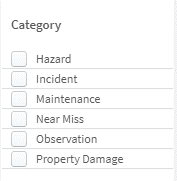
- Priority
Filter data by the priority level of issues (e.g., High, Medium, Low, None) – you can select more than one by clicking the checkbox next to each priority.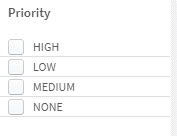
- Status
Filter data by the status of issues (e.g., OPEN, OVERDUE, RESOLVED) – you can select more than one by clicking the checkbox next to each status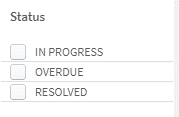
- Year/Month
Filter data by the date the issue was created – you can select more than one by clicking the checkbox next to each year and month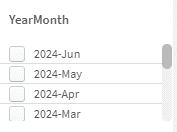
- Sites
Filter data by specific site locations – you can select more than one by clicking the checkbox next to each category. This filter must be clicked to be displayed as it offers the ability to drill down between the Site hierarchy you have setup in SafetyCulture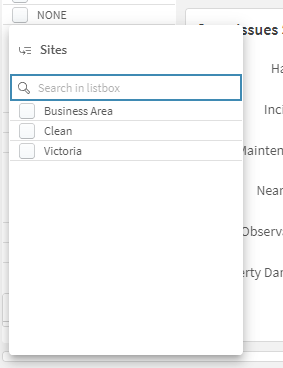
- Detailed Analysis Use filters to conduct a detailed analysis of issues data, identifying trends and patterns that may not be visible in the aggregated view.
- Combine Filters Combine multiple filters to narrow down the data to specific subsets for more granular insights.
The main area of the dashboard contains various charts that provide a detailed view of issues based on different criteria. These charts include:
- Issue Priority (Donut Chart)
- Issue Categories (Bar Chart)
- Issues Status (Donut Chart)
- Open Issues Status (Bar Chart)
- Relationship Diagram (Sankey Chart)
- Issues Table (Table)
This chart shows the breakdown of issues by their priority levels. You can use this chart to:
- Analyze the proportion of issues that are low, medium, high and none priority.
- Ensure that high-priority issues are being managed appropriately.
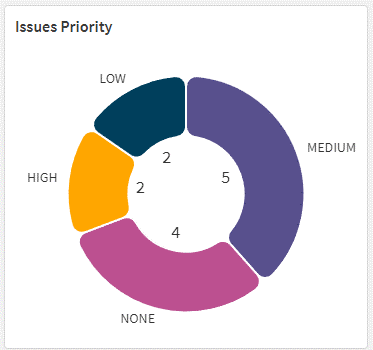
This chart displays the number of issues over time, categorized by their category. You can use this chart to:
- Identify trends in the number of issues over different months.
- Monitor how different types of issues fluctuate over time.
- Spot any spikes or drops in issue creation rates.
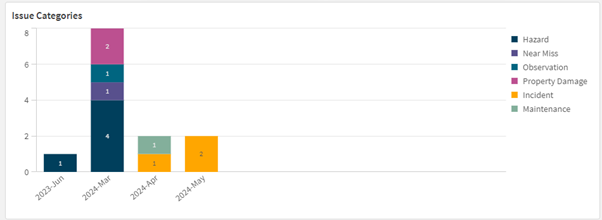
This chart shows the breakdown of issues by their status. You can use this chart to:
- Quickly assess the proportion of open versus resolved issues.
- Use this chart to identify if open issues are a significant problem and require immediate attention.
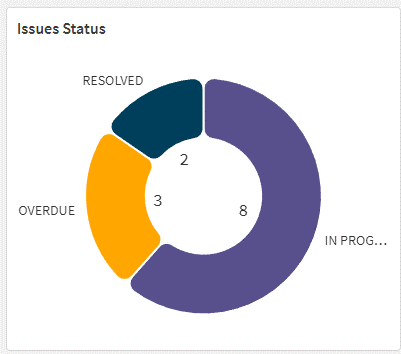
This chart displays the status of open issues by category, priority or site. You can adjust this by using the buttons on the top of the chart. You can then use this chart to:
- Analyse which categories (e.g., Hazard, Near Miss) have the most open issues and their respective overdue statuses.
- Analyse which priorities (e.g., High, Medium) have the most open issues and their respective overdue statuses.
- Analyse which sites have the most open issues and their respective overdue statuses.
- Identify categories, priorities or sites that may need more resources or focus to close out issues.
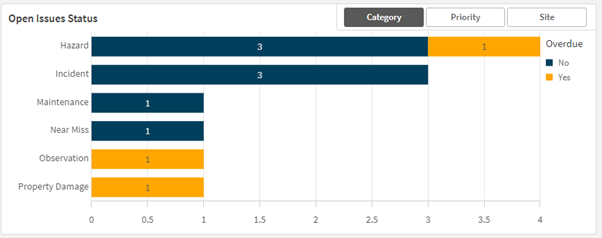
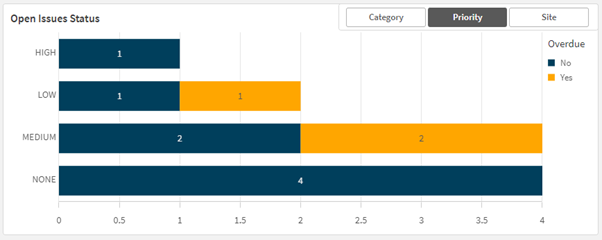
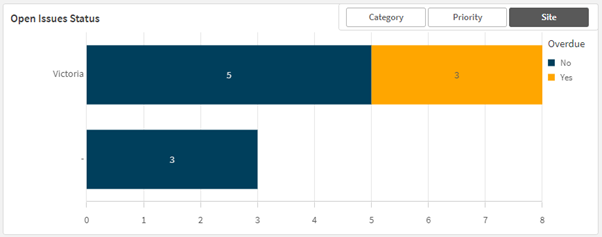
This chart visualised the flow of issues from category to priority, then to status and finally indicating whether they are overdue. This can be used to:
- Understand the distribution and flow of issues from their category through to their current status and overdue status.
- Identify any bottlenecks or issues in the process by observing the connections and flow between different stages.
- Use the diagram to identify areas where high-priority issues are not progressing as expected.
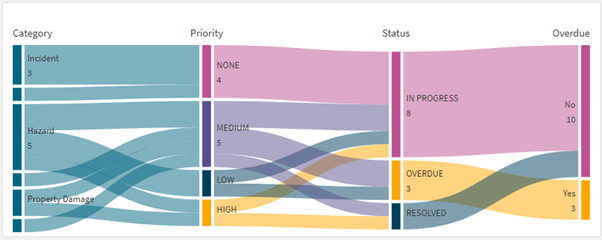
The tabular view can be accessed by selecting the ‘Table’ display option in the sidebar. This table details the issues from within the SafetyCulture platform. The table also provides the following features:
- Edit or view the original issue details within the SafetyCulture platform by clicking on the ‘SC Issues’ link in the corresponding row.
- Edit any inspection associated with an issue within the SafetyCulture platform by clicking on the ‘SC Inspections’ ‘Edit Inspection’ link in the corresponding row.
- View any inspection associated with an issue within the SafetyCulture platform by clicking on the ‘SC Inspections’ ‘View Inspection’ link in the corresponding row.
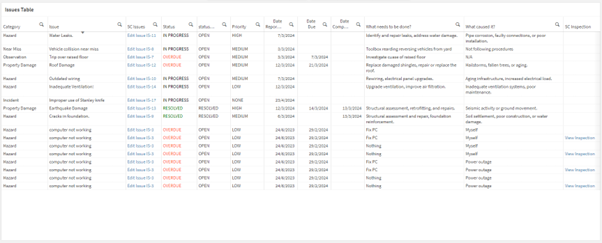
Your business manager would like to analyse the status of high-priority quality issues created in the last six months.
- In the filters, select "Quality Issues" under Category.
- Select "High" under Priority.
- Set the Year/Month filter to include the last six months.
- Review the updated charts, particularly the "Issue Categories" and "Sankey Diagram," to analyse the progress and current status of these issues.